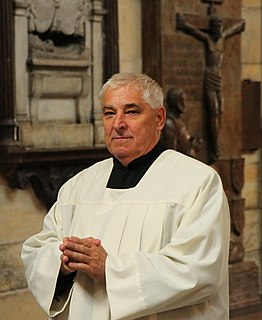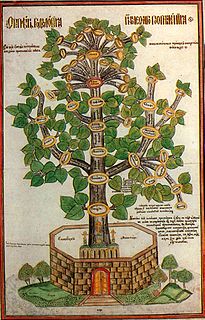 W
WAn altar server is a lay assistant to a member of the clergy during a Christian liturgy. An altar server attends to supporting tasks at the altar such as fetching and carrying, ringing the altar bell, helps bring up the gifts, brings up the book, among other things. If young, the server is commonly called an altar boy or altar girl. In some Christian denominations, altar servers are known as acolytes.
 W
WIn some Christian churches, a reader is responsible for reading aloud excerpts of scripture at a liturgy. In early Christian times the reader was of particular value due to the rarity of literacy.
 W
WIn many Christian Denominations, an archbishop is a bishop of higher rank or office. In some cases, such as the Lutheran Church of Sweden and the Church of England, the title is borne by the leader of the denomination. In others, such as the Roman Catholic Church, there are many archbishops who either have jurisdiction over an ecclesiastical province in addition to their own Archdiocese, or are otherwise granted a titular archbishopric.
 W
WAn archdeacon is a senior clergy position in the Church of the East, Chaldean Catholic Church, Syriac Orthodox Church, Anglican Communion, St Thomas Christians, Eastern Orthodox churches and some other Christian denominations, above that of most clergy and below a bishop. In the High Middle Ages it was the most senior diocesan position below a bishop in the Catholic Church. An archdeacon is often responsible for administration within an archdeaconry, which is the principal subdivision of the diocese. The Oxford Dictionary of the Christian Church has defined an archdeacon as "A cleric having a defined administrative authority delegated to him by the bishop in the whole or part of the diocese." The office has often been described metaphorically as that of oculus episcopi, the "bishop's eye".
 W
WThe title archimandrite, used in Eastern Christianity, originally referred to a superior abbot whom a bishop appointed to supervise several "ordinary" abbots and monasteries, or as the abbot of some especially great and important monastery.
 W
WThe term exarch comes from the Ancient Greek ἔξαρχος, exarchos, and designates holders of various historical offices, some of them being political or military and others being ecclesiastical.
 W
WA chorbishop is a rank of Christian clergy below bishop. The name chorepiscope or chorepiscopus is taken from the Greek χωρεπίσκοπος and means "rural bishop".
 W
WThe term exarch comes from the Ancient Greek ἔξαρχος, exarchos, and designates holders of various historical offices, some of them being political or military and others being ecclesiastical.
 W
WA deacon is a member of the diaconate, an office in Christian churches that is generally associated with service of some kind, but which varies among theological and denominational traditions. Major Christian churches, such as the Catholic Church, the Oriental Orthodox Churches, the Eastern Orthodox Church, the Scandinavian Lutheran Churches and the Anglican Church, including the Free Church of England, view the diaconate as part of the clerical state.
 W
WEastern Christian Monasticism is the life followed by monks and nuns of the Eastern Orthodox Church, Oriental Orthodoxy, the Church of the East and Eastern Catholicism. Some authors will use the term "Basilian" to describe Eastern monks; however, this is incorrect, since the Eastern Church does not have religious orders, as in the West, nor does Eastern monasticism have monastic Rules, as in the West.
 W
WThe term exarch comes from the Ancient Greek ἔξαρχος, exarchos, and designates holders of various historical offices, some of them being political or military and others being ecclesiastical.
 W
WHegumen, hegumenos, or igumen is the title for the head of a monastery in the Eastern Orthodox and Eastern Catholic Churches, similar to the title of abbot. The head of a convent of nuns is called a hegumenia or ihumenia. The term means "the one who is in charge", "the leader" in Greek.
 W
WA Hierodeacon, sometimes translated "deacon-monk", in Eastern Orthodox Christianity is a monk who has been ordained a deacon. The term literally translates as "sacred servant ", in accordance with early Byzantine usage of the adjective "sacred" to describe things monastic.
 W
WA hieromonk, also called a priestmonk, is a monk who is also a priest in the Orthodox Church and Eastern Catholicism.
 W
WIn certain Christian churches, holy orders are the ordained ministries of bishop, priest (presbyter), and deacon, and the sacrament or rite by which candidates are ordained to those orders. Churches recognizing these orders include the Catholic Church, the Eastern Orthodox, Oriental Orthodox, Anglican, Assyrian, Old Catholic, Independent Catholic and some Lutheran churches. Except for Lutherans and some Anglicans, these churches regard ordination as a sacrament. The Anglo-Catholic tradition within Anglicanism identifies more with the Roman Catholic position about the sacramental nature of ordination.
 W
WIn Christian churches with episcopal polity, the rank of metropolitan bishop, or simply metropolitan, pertains to the diocesan bishop or archbishop of a metropolis.
 W
WProedros was a senior Byzantine court and ecclesiastic title in the 10th to mid-12th centuries. The female form of the title is proedrissa (προέδρισσα).
 W
WA protosyncellus or protosynkellos is the principal deputy of the bishop of an eparchy for the exercise of administrative authority in an Eastern Orthodox or Eastern Catholic church. The equivalent position in the Western Christian churches is vicar general.
 W
WIn some Christian churches, a reader is responsible for reading aloud excerpts of scripture at a liturgy. In early Christian times the reader was of particular value due to the rarity of literacy.
 W
WA starets is an elder of an Eastern Orthodox monastery who functions as venerated adviser and teacher. Elders or spiritual fathers are charismatic spiritual leaders whose wisdom stems from God as obtained from ascetic experience. It is believed that through ascetic struggle, prayer and hesychasm, the Holy Spirit bestows special gifts onto the elder including the ability to heal, prophesy, and most importantly, give effective spiritual guidance and direction. Elders are looked upon as being an inspiration to believers and an example of saintly virtue, steadfast faith, and spiritual peace.
 W
WVladika or Wladika is a Slavic title and address of bishops in the Eastern Orthodox Church. In Old Church Slavonic, the meaning of the word is Mr.